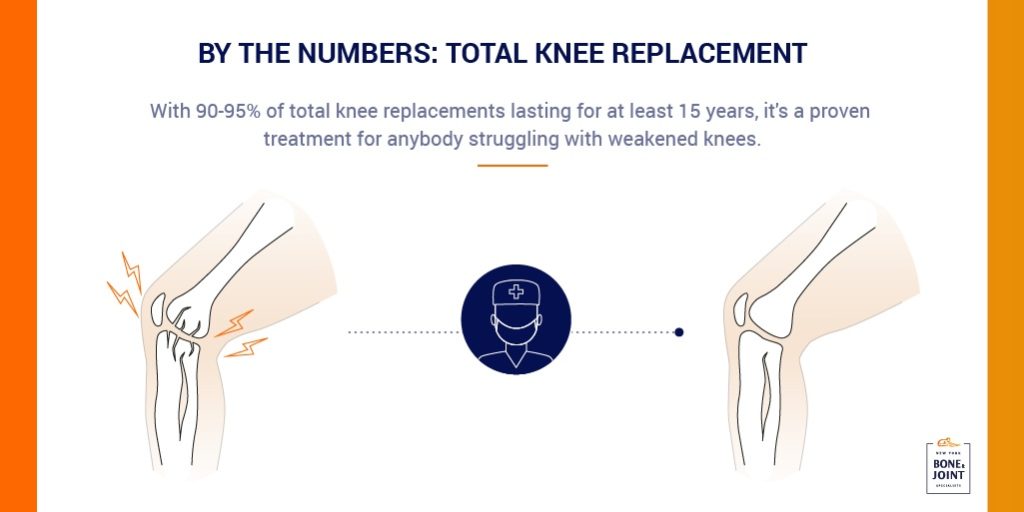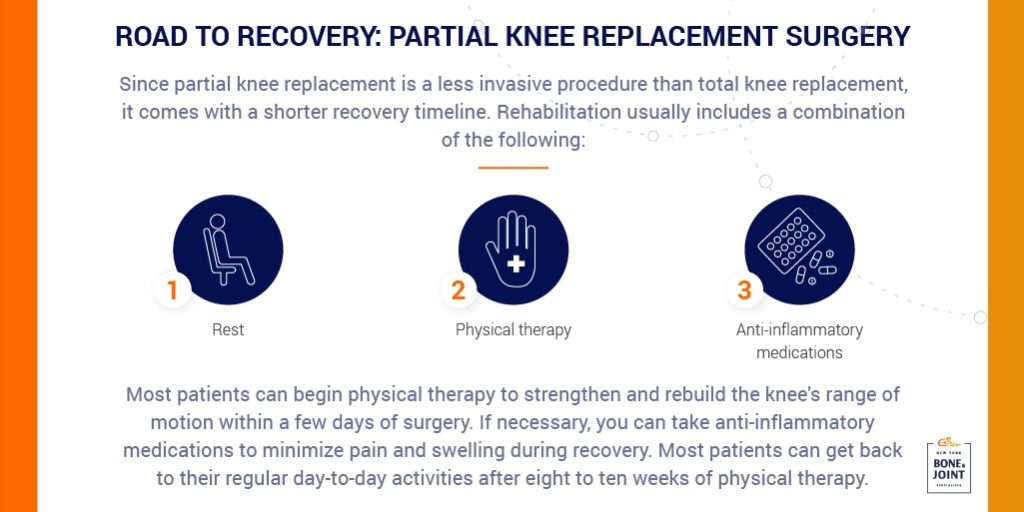Is chronic knee pain limiting your daily activities and robbing you of the life you love?
Millions of Americans struggle with debilitating knee pain that affects everything from climbing stairs to playing with grandchildren. When conservative treatments no longer provide relief, knee replacement surgery can be life-changing.
More than 700,000 Americans choose knee replacement surgery each year, making it one of the most successful orthopedic procedures performed today.
At New York Bone & Joint Specialists, our specialist knee surgeons utilize cutting-edge techniques, including robotic-assisted surgery, to deliver optimal outcomes.
Don’t let knee pain define your future. Our expert team will guide you through every step of the process, from initial consultation to complete recovery.
Understanding Knee Replacement Surgery
Your knee joint is a remarkable engineering marvel that connects three bones: the femur (thighbone), tibia (shinbone), and patella (kneecap). This complex structure includes ligaments, muscles, tendons, and the meniscus—a ring of cartilage that cushions the joint and acts as a shock absorber. Together, these components allow you to walk, run, climb stairs, and move freely.
Despite its durability, the knee joint can be damaged by injury or wear down over time. When pain becomes severe and daily activities are significantly limited, knee replacement surgery may be the best option for restoring function and eliminating pain.
Who Is a Candidate for Knee Replacement Surgery?
Knee replacement is typically recommended when:
Conservative treatments have failed, including physical therapy, medications, weight management, and injections
Daily activities are significantly limited by pain and stiffness
Pain interferes with sleep and quality of life
X-rays show significant joint damage from arthritis or injury
Common Conditions Leading to Knee Replacement
Knee replacements are usually a result of damage from:
Osteoarthritis: The most common reason for knee replacement. Protective cartilage wears down over time, causing bone-on-bone contact and severe pain. Most common in adults over 50.
Rheumatoid Arthritis: An autoimmune condition where the body’s immune system attacks joint tissues, causing inflammation and cartilage destruction.
Post-Traumatic Arthritis: Develops after a knee injury, fracture, or torn ligament, accelerating joint degeneration.
Osteonecrosis: Occurs when bone tissue dies due to insufficient blood supply, causing joint collapse and severe pain.
“Modern knee replacement surgery has revolutionized how we treat severe arthritis, with techniques that preserve more of your natural bone and allow for faster recovery. Our goal is to repair your knee and get you back to enjoying life without constant pain.” – Dr. Leon Popovitz, MD, Co-Founder of New York Bone & Joint.
Total Knee Replacement: For Severely Damaged Knees
Total knee replacement is recommended for patients with severe, widespread joint damage. This proven procedure has helped millions of people return to active, pain-free lives.
The Procedure:
- Duration: 1-2 hours under general or spinal anesthesia
- Approach: Surgeon removes damaged bone and cartilage from the entire joint
- Replacement: High-grade metal and plastic prosthetic components recreate natural joint function
- Hospital Stay: Typically 1-3 days, depending on recovery progress
- Success Rate: Over 95% of patients experience significant pain relief and improved function

Recovery Timeline:
- First 6 weeks: Use of walker or crutches, beginning physical therapy
- 6-12 weeks: Gradual return to normal daily activities
- 3-6 months: Continued improvement in strength and range of motion
- 6-12 months: Full recovery and return to desired activities
Partial Knee Replacement: Minimally Invasive Option
If only parts of your knee have been affected by arthritis, you may be a candidate for a partial knee replacement. Between 20 percent to 25 percent of patients are eligible for a partial knee replacement.
Benefits of Partial Knee Replacement:
- Preserves healthy bone and tissue
- Smaller incision results in less tissue damage
- Reduced blood loss and post-operative pain
- Faster recovery with most patients going home the same day
- More natural-feeling knee movement
- Easier revision if needed in the future
Recovery Timeline:
- First 2 weeks: Limited activity with gradual mobility improvement
- 3-6 weeks: Return to normal daily activities
- 6-8 weeks: Complete recovery with full range of motion
Our knee specialists will discuss each option and decide which is best for you, taking into account your overall health and lifestyle.

Our Expert Knee Replacement Surgeons
At New York Bone & Joint Specialists, our knowledgeable and experienced knee surgeons ensure a successful outcome for partial and full knee replacements.
- We employ board-certified orthopedic surgeons.
- Fellowship trained in knee replacement surgery and other knee treatments.
- Our team is up-to-date on the latest knee replacement surgery techniques, including minimally invasive procedures such as robotic-assisted surgeries that permit more precise surgical movements to preserve much of the original tissue and bone.
- We follow our patients through the entire process, from surgery to full recovery.
Top 5 Mistakes After Knee Replacement Surgery
Knee replacement surgery is one of the most successful orthopedic operations performed today. To increase your chance of a full recovery, avoid these top five mistakes after knee replacement:
- Skipping physical therapy. Keep your physical therapy appointments and do your exercises at home several times a day to strengthen and stretch your knee. Full recovery takes time and commitment to physical therapy.
- Returning to activities too quickly. Returning to strenuous physical activities will delay your progress. To stay active while you recover, stick to low-impact activities, such as walking, before you plunge into more intense exercise.
- Poor pain management. If you experience severe pain, stop what you are doing and rest. Never exercise through pain. Talk to your doctor or physical therapist about changing your exercises to lessen any discomfort.
- Not following medication instructions. Your doctor will give you pain medication after the surgery. Take the medication only as prescribed, in the dosage and at the times indicated.
- Neglecting follow-up appointments. Follow-up appointments give your doctor a chance to remove stitches and see how you are progressing in recovery. Your doctor may need to modify your physical therapy program.
Knee Replacement Exercises to Avoid
During your recovery, your doctor may advise you to avoid certain activities to allow the bone and soft tissue to fully heal. Follow these tips to get back on your feet:
- Avoid high-impact exercises. Running, tennis, and basketball.
- Stay away from movements that stress the joint. Frequent stopping, pivoting, and deep bending at the knee.
- Stick to your timeline for activity restrictions. Low-impact activities (walking, light household chores) after the surgery are fine. More strenuous exercise can restart after about 12 weeks to 10 months, depending on which surgery you had. But check with your doctor and physical therapist before taking your workouts to the next level.
- Try safe exercise alternatives. Focus on exercises to strengthen muscles around the knee and improve the knee’s range of motion. Exercising boosts blood flow and can prevent blood clots.
Why choose us for knee replacement surgery in NYC?
New Yorkers have trusted our knee replacement doctors and surgeons for decades. We are recognized as leaders in the field due to our:
- Commitment to Joint Health: We prioritize the health and healing of your joints, understanding their vital role in an active and fulfilling life.
- Comprehensive & Compassionate Care: Our world-class specialists provide expert, empathetic guidance from diagnosis through rehabilitation.
- Effective Non-Surgical Solutions: Over 90% of knee pain cases are successfully resolved through our orthopedic treatments, often avoiding surgery.
- Dedication to Your Full Recovery: We are committed to your complete recovery, utilizing conservative methods and only resorting to expert surgical intervention when absolutely necessary.
NYC’s Top-Rated Knee Replacement Specialists
At New York Bone & Joint Specialists, our philosophy centers on preserving your body’s natural structures, particularly for long-term knee health. This commitment to exceptional care means 90% of our patients recover without surgery, ensuring lasting health and function, and offering peace of mind.
Make an appointment today
Ready to take the first step toward relief? Schedule an appointment with New York Bone & Joint Specialists and start your personalized recovery plan today.
Knee Replacement: FAQs
How long does knee replacement surgery take?
Knee replacement surgery can take one to two hours, depending on the type of surgery performed. You’ll be under general anesthesia or regional anesthesia (epidural or spinal anesthesia) during the operation and will stay in a recovery room before being discharged home or to a hospital room.
What is the difference between total and partial knee replacement?
Total knee replacement involves a complete removal of the knee joint, including bone and cartilage, while partial knee replacement only replaces the damaged parts of the knee. Full knee replacement is reserved for severe arthritic degeneration. Less significant damage can be treated with a partial knee replacement.
How long is knee replacement recovery time?
Initial recovery from a partial knee replacement is shorter than for a full knee replacement — about six weeks compared to 12 weeks, respectively.
At that time, patients can return to work, drive, or do other normal tasks, provided they are not too strenuous. Full recovery from a full knee replacement can take months. Patients start physical therapy immediately following the surgery and slowly increase the difficulty of the exercises. A physical therapist will tell you when to ramp up your activity.
What are the top mistakes to avoid after knee replacement?
Beginning strenuous activities too soon after surgery and not following through with the physical therapy program. Missing follow-up appointments with your doctor to assess your healing is another mistake.
What exercises should I avoid after knee replacement?
Don’t do high-impact activities (running, tennis, basketball) until you get the okay from your doctor. That could take several weeks or months. Avoid any movement that involves frequent stopping and pivoting motions. Stick to low-impact activities, such as walking or pedaling a stationary bike, to put less stress on the knee joint.
What are the risks of knee replacement surgery?
Complications from knee replacement surgery are rare, but could include infections and blood clots. That’s why it’s so important to get moving soon after the surgery to prevent clots and build up your strength.











